Daredevil: Born Again shows the MCU can deal with real-world issues

Daredevil: Born Again is a revival of Netflix's Daredevil, a show that ran for three seasons and stands as the most critically acclaimed television series in the Marvel Cinematic Universe. The new show had big shoes to fill, and for the most part, it succeeds in being a worthy continuation of the original show with a stellar storyline, well-developed characters and brutal action sequences.
The story takes place several years after the ending of the original series. Matt Murdock, having abandoned his superhero identity, is compelled to return when Wilson Fisk (The Kingpin) becomes New York's mayor and begins a conspiracy to outlaw masked vigilantes while expanding his criminal empire.
Before starting the critical analysis, it is important to note that halfway through production, the show went through a complete creative overhaul. Essentially, before the show had fewer connections both in terms of tone and storyline to the previous series. They included previously completed episodes but also added new content that connected it to the Netflix series. The show's resulting mixture of two different visions is apparent, with episodes clearly distinguishable as pre- and post-overhaul.
The weakest parts of the show are the pre-overhaul episodes. While it starts off solid, the plot progresses very slowly, with Matt not suiting up as Daredevil for quite a long time. The newer supporting characters are not as nuanced or likeable as Foggy Nelson and Karen Page from the original series, and it is even more evident when those characters eventually show up here. They introduced a new villain named Muse, who began as an intriguing character, but unfortunately, his arc did not live up to its potential. However, other new characters like the superhero White Tiger and Daniel Blake, Fisk's protégé, were genuinely interesting and added depth to the narrative.
That being said, the rest of the show proves why Charlie Cox's Daredevil remains arguably the best-written hero in the MCU. His rivalry and dynamic with Vincent D'Onofrio's Kingpin continues to be iconic, and the expert cinematography and visual storytelling of the scenes just add icing on the cake to their respective character arcs. Returning characters such as Benjamin Poindexter (Bullseye) and Frank Castle (The Punisher) have their own mini-arcs that further add tension and nuance to the story. Despite the slow build, the character development and overall narrative make the show amazing.
The major problem with MCU heroes, such as the Avengers, is that they seldom deal with "real" problems that affect everyday people. They're always fighting aliens, monsters, or a threat to the planet or multiverse, and the movies focus heavily on massive CGI battles rather than showing the heroes actually "save" civilians. Daredevil actually deals with grounded issues, and this show in particular parallels real-world issues of corrupt people becoming politicians and exploiting average citizens. Besides the obvious parallel between Fisk's election and Trump's presidency, an interesting plot point is also featured where corrupt cops use the Punisher's logo to commit murders, reflecting the real-world misuse of the symbol by American police and far-right white supremacists.
Despite a few weaknesses, like the pacing issues and inconsistent episode quality, Daredevil: Born Again is a fantastic show with compelling characters, a narrative that strays away from the standard superhero fare in favour of realistic world building. It is undoubtedly one of the best projects in the MCU in the past few years, and a worthy follow-up to the fan-favourite Netflix show.

 For all latest news, follow The Daily Star's Google News channel.
For all latest news, follow The Daily Star's Google News channel. 









Comments